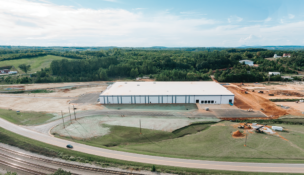
About a quarter of all Fredericksburg-area residents work for the federal government or a contractor, but so far the region hasn’t seen significant financial pain. Photo by Jay Paul

About a quarter of all Fredericksburg-area residents work for the federal government or a contractor, but so far the region hasn’t seen significant financial pain. Photo by Jay Paul
Fredericksburg weighs impact of federal job cuts
Chris Suarez //July 29, 2025//
Summary:
- Nearly 59,000 federal jobs cut nationwide under Trump
- Local officials see mixed economic signals but prep for fallout
- Data center expansion seen as key to regional revenue growth
Northern Virginia politicians, all Democrats, started sounding the alarm immediately about federal job cuts and slashing of federal agencies’ budgets at the start of the second Trump administration in January.
And there have been significant impacts in Fairfax and Arlington counties, as well as Alexandria, where the U.S. Department of Housing and Urban Development is moving its headquarters — and displacing the National Science Foundation.
As of June, the federal government reports that it has gotten rid of about 59,000 federal jobs through layoffs and buyouts, a far cry from the approximately 10% of the two million-plus workforce that Trump said he aimed to cut.
Meanwhile, the state has reported since January that nearly 1,500 private-sector employees in Northern Virginia have been laid off by companies that perform contract work for the government, such as McLean-based Mitre, which laid off 442 people in early June, and Reston-based Leidos and its subsidiaries, which have shed more than 100 jobs related to the loss of contracts.
Job cuts and related economic woes, Virginia Democrats warned, weren’t going to stop at the beltway. They were coming for Fredericksburg and surrounding counties, too.
At a February ribbon-cutting ceremony for the Department of Veterans Affairs‘ health care center in Spotsylvania, U.S. Sen. Mark Warner had a serious message to deliver about laid off VA employees, part of the Trump White House’s cuts. The clinic where he stood, the VA’s largest health care facility in the nation, was “close to 500 employees short,” Warner said during his comments.
Fellow Democratic lawmakers U.S. Sen. Tim Kaine and U.S. Rep. Eugene Vindman, on hand at the ceremony, also criticized the administration for halting new hires at the clinic, at the expense of access and service for patients.
“These attacks have destabilized the job market, strained local businesses and disrupted economic stability on communities like Fredericksburg that have relied on a federal presence,” Warner said in a statement this summer.
However, employment conditions don’t seem as bad as some predicted, at least in the Fredericksburg area. Six months into the new presidential administration, officials in Fredericksburg and Spotsylvania and Stafford counties say there have not been any major layoffs locally.
“We were told to anticipate a large number [of layoffs], and we haven’t seen it,” says Kevin Marshall, a Spotsylvania supervisor as well as the county’s business development manager. “Personally, I think federal workers who took the buyouts are happily retired. The ones who were laid off are educated folks. They have skills. I think they’re putting in for jobs within the private sector, and they’re getting hired.”
And a VA representative dismissed the notion that cuts have impacted service at the Spotsylvania clinic, which is expected to serve 35,000 patients annually.

“There is a lot of disinformation circulating about the VA Fredericksburg Health Care Center,” Tara Ricks, a regional VA spokesperson, wrote in an email. “The clinic’s staffing is right on track with its phased opening plans. We started with approximately 230 team members, we’re now up to 289 employees, and another 266 are in various stages of recruitment.”
Still, says Joshua Summits, director of economic development and tourism for the city of Fredericksburg, “I think everyone here knows someone who has been affected by the [Department of Government Efficiency] cuts or the dropping of contracts from offices up north.”
The full impact of the cost-cutting efforts in the region may not be felt until later this year, says João Ferreira, a regional economist with the Weldon Cooper Center for Public Service at the University of Virginia, which released a report in April anticipating the loss of 32,000 jobs statewide this year and an average 4.7% Virginia unemployment rate in 2026. As of May, the state’s unemployment rate was 3.4%, and it was the same in Spotsylvania and Stafford, with Fredericksburg slightly higher at 3.6%.
Uncertainty about jobs, tariffs and the stock market, however, will likely lead to greater economic volatility, Ferreira says. “If less money is poured into the Virginia economy, that will have an impact that will end up affecting everyone in Virginia. If people have less money, they go less to restaurants, they also travel less and they buy fewer things in the grocery stores.”
Ferreira says he’s not worried about a full-blown recession related to job losses. “Many people are speaking about this being like the great crisis of 2008 or COVID in 2020,” he says. “I don’t think it is even close to that. Let’s be honest.” But he says there will be “winners and losers” in certain sectors, with finance and defense contractors likely to come out on top.
And that leaves local officials in the Fredericksburg region working to assess and guess the current and future impact to their economies.
That fed life
About a quarter of all workers who live in Stafford are employed by the federal government or a private-sector government contractor, says Liz Barber, Stafford’s economic development authority director, and Marshall, her counterpart in Spotsylvania, cites similar stats. Summits estimates that fewer Fredericksburg residents work for the federal government, but it’s still a major employer, along with contractors.
Democratic state Del. Joshua Cole, who represents Fredericksburg and parts of the two counties, notes that many of his constituents commute to Washington, D.C., the Pentagon or military bases at Quantico, Dahlgren and Fort Belvoir. For decades, local commuters have picked up riders from so-called “slug lines” that allow them to access faster high-occupancy-vehicle lanes on Interstate 95.
“They commute every day, whether it’s in a slug line or van line. People are up and down the road,” Cole says. “And we can’t forget that there are a bunch of government contractors here in this region, too.”
Meanwhile, Barber says her office has heard little from local businesses about adverse effects from Trump’s economic policies and federal spending cuts, although she’s noticed an unusually high number of federal employees applying for administrative roles in her office.
On the other hand, she says the local real estate market has remained strong with high prices and low inventory, despite fears that many federal government workers would sell their homes in a hurry to leave the region and find jobs elsewhere — a trend noted in other parts of Northern Virginia, where real estate stats have remained steady this year.
Despite all the headlines about federal job cuts, some employees’ layoffs were rescinded under judges’ orders or after administration officials acknowledged they needed certain workers for their agencies to function.
The fluctuation has led to confusion about where things truly stand, even for researchers.
“Others are contesting the layoffs, and others are simply trying to find a new job,” Ferreira says. “These things take time.”
Meanwhile, there are other matters that people are focusing on, whether it’s the impact of potential Medicaid cuts, off-and-on tariffs, the Middle East conflict or something completely outside of politics.
“People aren’t talking about the layoffs anymore, but it’s still happening,” Cole says. “And I think also, besides the job cuts, it’s about what’s going to happen to services, whether it’s cuts to SNAP [food assistance] and housing benefits.”
Speaking in June, Barber was putting finishing touches on a survey to be sent to Stafford’s businesses to find out what’s happening on the ground.
“At this time, we are finalizing a survey that will go out to the business community to best gauge those effects,” she says. “It’s really important to our department and the county to determine those effects so we can create programming, events or resources to best target what the business industry is saying that they need at this time.”
Marshall says he has not heard from business owners about any significant problems from the federal cuts so far — and they aren’t shy about letting him know when the chips are down.
“If they’re experiencing any issues or problems, they pick up the phone and call. And they’re very quick to do that,” he says. “I did talk to one of them recently who has a testing facility for some of our government programs, and their business has increased. They’re doing a lot of stuff for our Space Force now.”
Regarding the VA clinic, Marshall says that it has been difficult to fill some positions due to a lack of qualified applicants, and in February, a VA spokesperson said that the federal hiring freeze would delay filling all 750 to 900 jobs there.
In Fredericksburg, Summits says there haven’t been too many indications of significant economic pain locally. He says sales tax and meals tax revenues were down by about 4.5% in the first couple months of the year, but business has improved through the spring.
Summits suggests that city-sponsored events like a weekly farmers market and a new summer “twilight” series that encourages businesses to stay open later on weeknights stimulates local spending.
“If we stay on track, it’s not going to be the dramatic drop that I think everyone was forecasting in those first two or three months of the year,” he says.
Data center solution?
Meanwhile, data centers remain a reliable source of tax revenue, even with controversies over their growth around the state. They could become even more critical to the local economy if there is a serious economic downturn related to federal budget and workforce cuts, officials say.
“We have to look at other sources of revenue and income that we can tap into if we lose federal funding,” Cole says, suggesting that higher taxes on the state’s growing casino gaming industry could also be part of the solution.
Earlier this year, Fredericksburg leaders approved zoning supporting a data center campus expected to generate $60 million in annual tax revenue upon completion. In Spotsylvania, four sites have been approved for data centers to be built, Marshall says, and although construction will take years, the county projects about $50 million in annual tax revenue, about one-eighth of the county’s general fund budget for the current fiscal year.
“It gives us an opportunity to possibly reduce our tax rates in the future,” Marshall says.
Meanwhile, developers are currently looking to build 25 million square feet of data centers in Stafford, with nearly half a billion dollars in tax revenue possible, Barber says. Crucially, though, many proposed projects lack full zoning approval from the county, so they’re not exactly a sure thing.
Prince William County, just up the road from Stafford, is still involved in a lawsuit brought by residents who feel that the massive Prince William Digital Gateway data center campus, approved in 2023, would be harmful to historic lands and green spaces, and are aiming to stop the project.
In recent months, Chesapeake turned down what would have been the Hampton Roads region’s first major data center project, and numerous Virginia counties and cities have instituted limits on data centers.
“Will all of them come to fruition? Likely not,” Barber says of Stafford’s proposed data centers, but “even if you consider half of them, that’s still a really significant economic impact for our community.” ■
Fredericksburg at a glance
- Fredericksburg: 28,029
- Spotsylvania: 149,920
- Stafford: 167,455
- Mary Washington Healthcare
- City of Fredericksburg
- Walmart
- Wegmans
- GEICO
- Stafford County
- FBI
- U.S. Department of Defense
- Spotsylvania County
- HCA Virginia
- The Publisher, Downtown Fredericksburg, a Tribute Portfolio Hotel
- Hyatt Place Fredericksburg-Mary Washington
- Holiday Inn Fredericksburg | Conference Center
- Courtyard Fredericksburg | Historic District
- FoodE (pronounced foodie) | Chef-driven American cuisine | foodefredericksburg.com
- Carl’s Frozen Custard | Curbside ice cream stand | carlsfrozencustard.com
- Sammy T’s | Fancy pub food | sammyts.com
- La Petite Auberge | Upscale French | lapetiteaubergefred.com


















